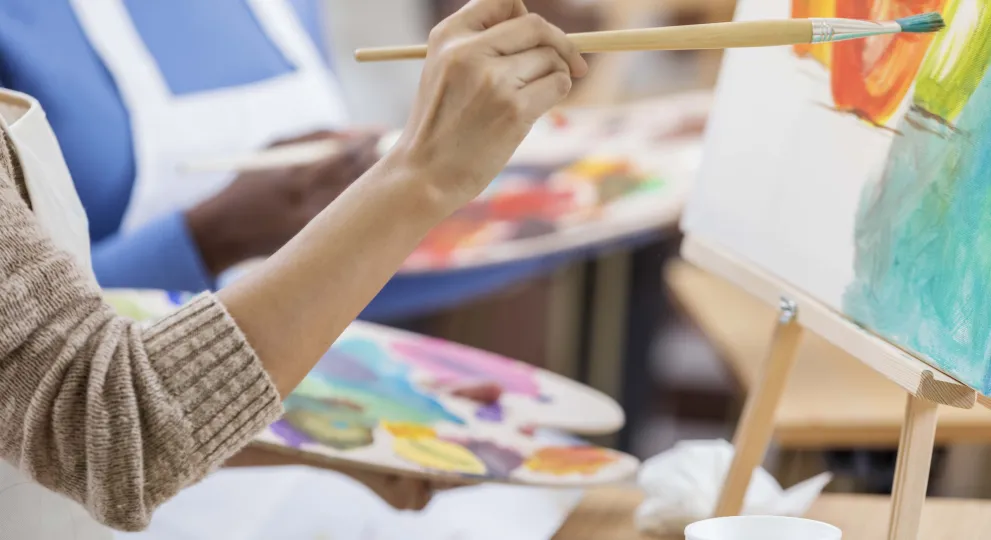Making Space for Creativity Along the Cancer Journey
Making Space for Creativity Along the Cancer Journey

From the moment of diagnosis, cancer can feel all-consuming — physically, emotionally, and mentally. Amid the appointments, uncertainty, and fatigue, it may seem hard to imagine making space for anything else.
Whether you are newly diagnosed, in the midst of treatment, or navigating survivorship, creative expression may offer a meaningful outlet for processing emotions and managing stress.
Creative expression can take many forms -- such as playing or listening to music, creating art, journaling, or doing craft projects. Or it could mean starting a new hobby, or reconnecting with a hobby you once enjoyed, such as painting, cooking or pottery.
Research has found that for people living with cancer, creative expressions such as music, drawing or sculpture may help lower stress and improve mood. Playing or listening to music may offer additional benefits beyond reducing stress, including lowering blood pressure, nervous tension and improving confidence.
Here are some of the benefits of creativity when you’re living with cancer:
- Creativity can bring you joy. Taking up a new hobby like painting, pottery, writing poetry, flower arranging, or gardening may be a great way to support yourself and find fulfillment
- Hobbies can foster connection. For example, joining a book club, a choir, or a community garden can lead to rewarding new friendships
- Building creative skills can be a welcome distraction. Both treatment and post-treatment follow ups can be a source of stress. Hobbies can distract you from your worries about cancer and help you discover new skills and hidden talents
Here are nine Microsteps that may help spark your creativity.
Reminding yourself about hobbies or activities you enjoyed as a child. Did you take lessons in dance, music, ice skating or art? All of these childhood pursuits can be turned into adult hobbies.
Finishing the sentence, “I always wanted to try . . . “
Don’t censor yourself, just jot down whatever comes to mind and visualize yourself engrossed in that activity and enjoying it. Then consider whether it’s possible or practical to pursue it now, even in a small way.
Playing a musical instrument you played in the past or learning a new one.
Playing an instrument can be relaxing and enjoyable, and may help lower anxiety and stress. Singing is another creative option, and studies show singing with others in a choir can build connection and resilience.
Dancing to music you love.
Dancing can help release stored emotion and reconnects you to your body; studies have found it can lower anxiety and promote relaxation. Don’t worry about what you look like or doing the right moves, just enjoy the experience and freedom of moving your body.
Spending a few minutes coloring, drawing, or painting.
Doing art projects at home or in a group setting is a great way to express yourself creatively and may help relieve anxiety. Let go of perfection: the goal is joy, not mastery, though your art may reveal hidden talents.
Taking photos of inspiring scenes or moments of joy throughout your day.
Notice the beauty all around you, whether it’s objects, scenery, or the smiles of family members and friends. It’s a great way to be creative, record your experiences, and share your photos. You may find joy in reflecting on these photos for years to come.
Cooking a new recipe, baking a cake, and learning about nutrition.
Getting creative in the kitchen can be fun and rewarding — making delicious meals for yourself and your loved ones can be an engrossing pastime when you focus and even lose track of time. Learning about preparing nutritious food may support you on your healing journey.
Using writing as a way to express your feelings and boost your well-being.
Writing poetry or prose — even just a few lines — can help relieve boredom, reduce feelings of depression, and provide a creative outlet to process your experience. Let the words flow without judgment. Don’t worry about being perfect — your unique voice will grow with time. If you’re curious to explore further, consider joining a writing or poetry group for support and inspiration.
Getting outdoors in your backyard and doing some gardening.
Growing plants and flowers or starting a small vegetable garden can be good for your physical and mental health. Being outside has been shown to help with deeper breathing, which has a number of positive effects on the body, and weeding, watering, and planting have been shown to lower stress and ease anxiety.
Developed with Thrive Global













